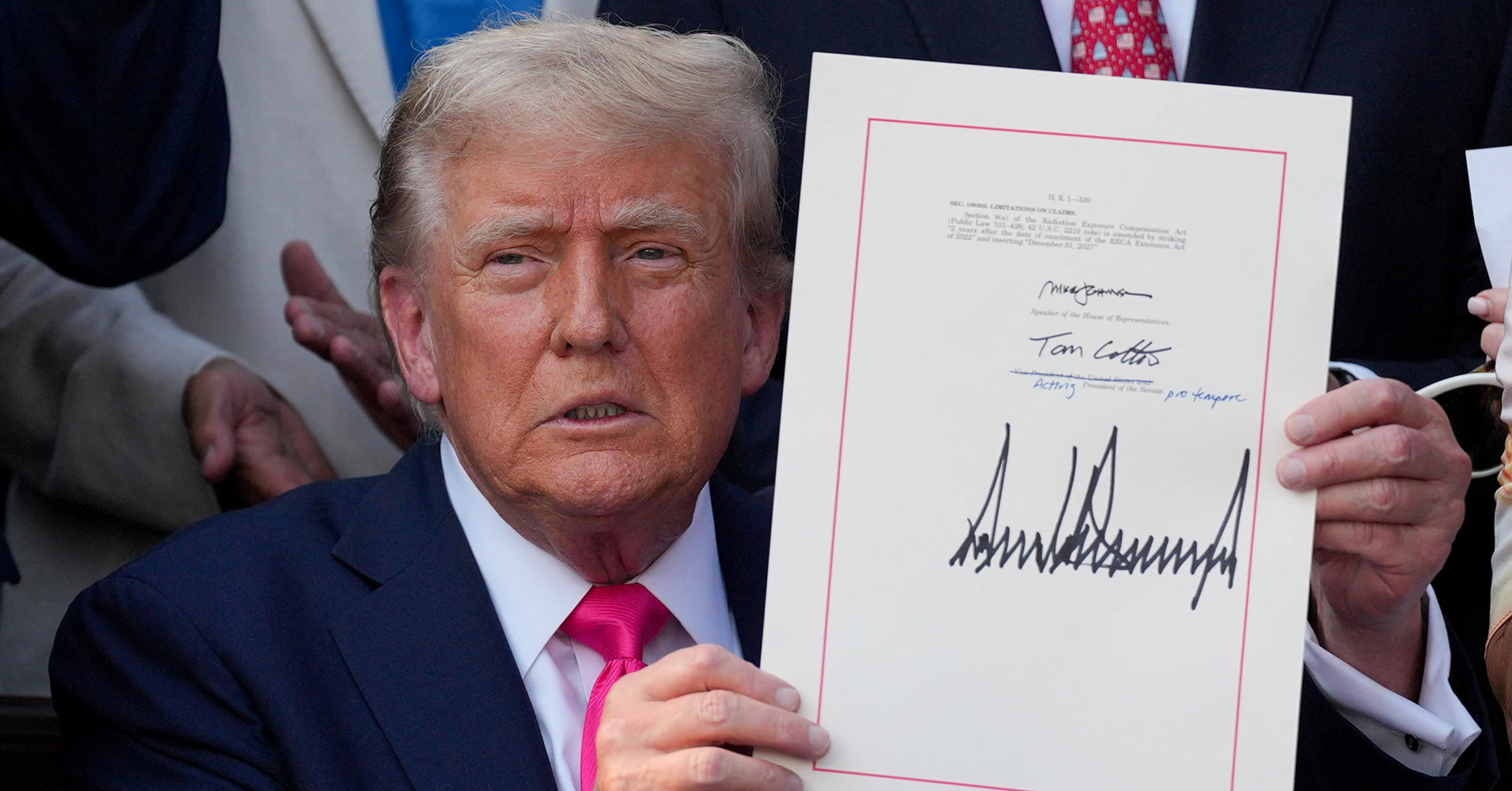
A coalition of philanthropies, individual donors, and academics is pushing U.S. lawmakers to pass legislation that they say will compel wealthy philanthropists to distribute money set aside for charitable giving much more quickly.
The group called the Initiative to Accelerate Charitable Giving, formed in December to push for changes to charitable giving rules, and their call is gaining momentum in Congress. Two U.S. senators — Chuck Grassley, a Republican from Iowa, and Angus King, an independent from Maine — have introduced a bill aimed at helping charities that provide “critically-needed resources” domestically and abroad to receive philanthropic funds faster by imposing deadlines on how long funders can keep money in donor-advised funds, or DAFs.
DAFs are accounts where individuals can warehouse their charitable contributions. They are often managed by financial firms like Fidelity Charitable or Schwab Charitable or by community foundations.
Under current U.S. law, DAF holders receive an immediate tax break when they set up the account. But currently, there are no deadlines for them to pay out the money, meaning much of it sits idle. The accounts have become popular with the newly wealthy and are among the fastest-growing vehicles for grantmaking.
Placing restrictions on how long money can stay in DAFs could free up an estimated $142 billion for charities. Another $1 trillion is held in endowments of private foundations required by U.S. tax law to pay out 5% of their assets annually. There are no such requirements for DAFs.
“I think this initiative here in America has the ability to set an example and really create groundbreaking norms that could be matched by other parts of the world.”
— Michael Sheldrick, cofounder, Global CitizenThe push to put limits on DAFs and close loopholes for private foundations comes as policymakers around the world seek to stimulate economic growth following a pandemic that has increased global poverty levels. And it has sparked debate in the philanthropic community over whether forcing donors to meet payout deadlines will actually benefit charities.
Several experts told Devex that without changes to the rules for DAFs, philanthropic dollars will continue to be withheld from nonprofits even as wealth increases for many of the richest Americans.
“I think this initiative here in America has the ability to set an example and really create groundbreaking norms that could be matched by other parts of the world,” said Michael Sheldrick, a cofounder of Global Citizen and the group’s chief policy, impact, and government relations officer.
Global Citizen is a member of the Initiative to Accelerate Charitable Giving, along with philanthropists like John Arnold and Melanie Lundquist, moral philosopher Peter Singer, and private foundations including the Ford Foundation, W.K. Kellogg Foundation, and the William and Flora Hewlett Foundation.
The DAF debate
In addition to foreign aid and debt relief, distributing more money from DAFs will be necessary to end extreme poverty and achieve the Sustainable Development Goals in the lowest-income countries by 2030, according to Global Citizen. The organization felt it couldn’t rely on government action alone to reach those goals, Sheldrick said.
“And that’s really what led to Global Citizen shifting its energy to increasing the amount of philanthropic dollars available, and it became quickly apparent to us where [the] action was needed was in the area of private foundations and donor-advised funds,” he said.
National Philanthropic Trust, a public charity that provides research data and also offers DAFs services, estimates that contributions to DAFs have increased by 80% since 2015. Grantmaking from DAFs to qualified charities also increased by 93% during that period. DAF grantmaking totaled more than $25 billion in 2019.
David Risher, CEO at Worldreader, is a former Amazon and Microsoft executive who is part of the Initiative to Accelerate Charitable Giving. Last year, he and his wife, Jennifer, launched the #HalfMyDAF campaign to get DAF holders to commit to donating half of their DAFs by a certain deadline. He said those kinds of grassroots efforts are helpful, but systemic changes would be more influential.
“I would expect and kind of hope that it will start here but will ripple around the world,” he said. “But it will take time. This is an area where the U.S. needs to be a leader, and it should be. We’ve got the resources to do something.”
Detractors of the Senate proposal include Philanthropy Roundtable, a conservative network of donors, which has said that the bill could harm the charities and communities it seeks to help by making DAFs less appealing — to the detriment of charities’ long-term goals or future projects.
“This payout requirement would limit the important ability for donors to allow their funds to grow over time and save up to make a larger charitable gift,” the group said in a statement.
The Council on Foundations, a trade association representing philanthropies, also has come out against the measure.
“Although we know foundations have a range of views on this proposal, we believe the changes in the bill will not achieve the ends we are all seeking to realize — greater support for nonprofits and communities, now and in the future, as we work together for the greater good,” the group said.
David Kass, COF’s vice president of government affairs, elaborated on the group’s position at COF’s “Leading Together” conference last week.
While the Council shares the bill authors’ belief that more money should be going to nonprofits and communities, it does not believe this bill will yield those desired results, he said. Kass said COF spearheaded an opposition letter sent to Capitol Hill last week that was signed by five “national philanthropic serving foundations.” The group also plans to form an ad hoc working group of community foundation CEOs focused on the bill, he said.
“Operating charities are in a bind, as they can’t actively complain about these growing pools of funds-in-waiting or they’ll risk not getting the funds when they are disbursed.”
— Brian Mittendorf, accounting professor, The Ohio State UniversityWhy now?
There has been greater scrutiny on how billionaires choose to spend — or not spend — their money and the laws that allow them to pay low tax rates as the world emerges from the COVID-19 pandemic that has resulted in many of them amassing even greater wealth. For example, a recent ProPublica report showed the 25 richest Americans paid very little in federal income taxes between 2014-2018 despite seeing huge spikes in their worth.
However, charities that haven’t traditionally spoken out against DAFs out of concern that it could jeopardize future funding will likely welcome this debate, said Brian Mittendorf, a nonprofit accounting professor at The Ohio State University.
An issue with the rapid expansion of DAFs is that fund sponsors like Fidelity and Schwab that see the most growth are built around serving donors, he said. They make donating assets and maximizing tax deductions easy, but also by their very nature delay delivery of funds to operating charities, according to Mittendorf.
“Operating charities are in a bind, as they can’t actively complain about these growing pools of funds-in-waiting, or they’ll risk not getting the funds when they are disbursed,” he said. “The proposed legislation recognizes this concern and offers some modest changes to address them.”
There is some debate about just how much money would be freed up if payout deadlines were imposed on DAFs.
A recent study released by professor Ray Madoff at Boston College Law and economics professor James Andreoni at the University of California San Diego — two members of the Initiative to Accelerate Charitable Giving — showed a $300 billion loss over a five-year period for charities that provide direct programs and services because of giving patterns at DAFs and foundations.
However, the study’s findings have been disputed by Philanthropy Roundtable researchers, who said that it omitted some working charities, specifically small nonprofits and religious congregations that had received DAF money.
The path forward
The Senate bill also proposes to give some flexibility to donors.
$120B sits in donor-advised funds. How can donors 'finish the job'?
Donor-advised funds are an untapped fundraising opportunity, says David Risher, CEO of Worldreader. As the pandemic forces many nonprofits to close their doors, #HalfMyDAF is one of several calls for DAF holders to give now, when the need is greatest.
For example, those who don’t plan to meet the payout requirement within 15 years could still receive upfront capital gains and estate tax benefits if their DAF money was distributed to charities within 50 years of donation. However, they would not receive the income tax deduction under this option until the funds were distributed.
The lawmakers also have proposed a carve-out for community foundations, which also sponsor DAFs. Donors could keep up to $1 million in a community foundation account without being subject to the bill’s payout requirements.
Additionally, the bill includes an incentive for private foundations to increase their annual payouts from the 5% minimum required by federal law to 7%. It also would bar them from meeting payout requirements through administrative expenses for a donor’s family, such as salaries or benefits. It also couldn’t be met through donations to DAFs.
Both King and Grassley acknowledged that the philanthropic sector was a “force for good across the globe” but said it was time for the tax code to change to address DAF practices.
Charitable dollars “ought to be doing the good they were intended for, not sitting stagnant to provide tax advantages for some and management fees for others,” said Grassley, who previously chaired and is still an influential Republican at the Senate Finance Committee.
King’s office said the senators will be working with members of both parties to build support for the legislation in the coming weeks.
“There is also the potential for the legislation to be included as part of a larger legislative vehicle that may come through [this] Congress,” an aide in King’s office told Devex.
However, Ken Kies, who lobbies for the Council on Foundations, also noted last week that the Congress had a full agenda; issues like infrastructure and year-end government funding bills would likely be prioritized over reforming charitable giving.








